← Back to Reviews
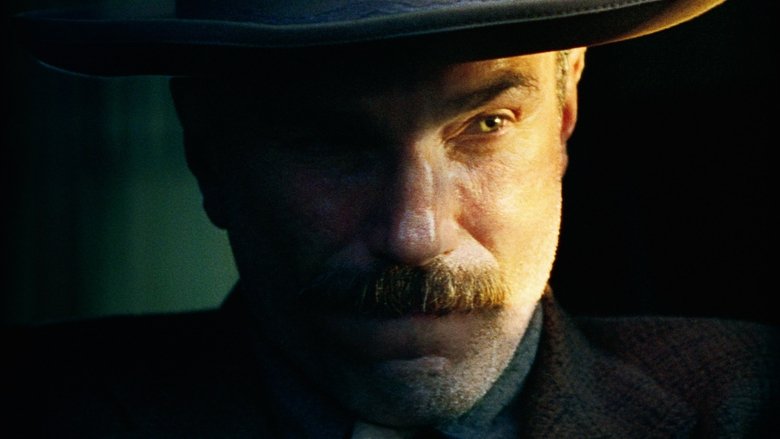
in
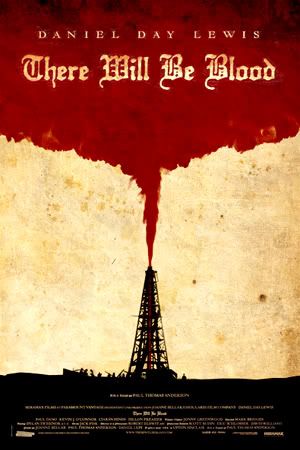
Director - Paul Thomas Anderson
Starring - Daniel Day-Lewis/ Paul Dano
You have to admire Paul Thomas Anderson. With There Will Be Blood he didn't just set out to make another film, it appears that he set out to make an epic. His aim was to produce an American masterpiece. Now whether you believe he achieved it or not, I think you at least have to admire the aspirations he had.
Anderson tells the story of Daniel Plainview (Daniel Day-Lewis), a silver prospector who stumbles into the world of oil and becomes determined to conquer that world, and crush all those who dare stand against him. Following a tip he heads out to a small town which hides an ocean of oil beneath it, looking to make his fortune with his son H.W. along for the ride. All is not plain sailing however as he clashes with a young, charismatic preacher (Paul Dano) and has to deal with an accident that leaves his son deaf. An incident that drives a wedge between the two.
Daniel Day Lewis gives a truly great performance as Daniel Plainview. Along with just his general performance he imbues the character with both a great voice and a really distinctive walk. However after all the praise and awards it earned him I was expecting it. So as a result the performance that really grabbed and surprised me was Paul Dano's as the young preacher, Eli Sunday. So much so that I consider it a shame he did not receive more nominations for his work. From the looks of him it might not seem like much of a rivalry can be had against the imposing character that is Daniel Plainview, but his performance makes Eli seem like a worthy adversary and protagonist; someone who is able to get under Plainview's skin. I particularly enjoyed when the character gets in front of his congregation and gets into the full swing of his showman persona, when he starts preaching and healing. It's just a shame for him he isn't around in the age of TV; he's a born televangelist. “Send me your money and you shall be saved!”
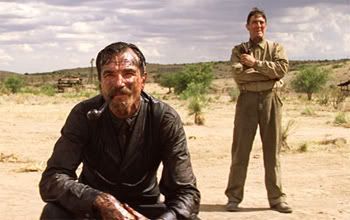
And it's just as well that these two central performances are so strong, as there are very few other significant roles to be found. For a film whose running time goes for more than two and a half hours that's quite surprising, and quite an achievement. It may not quite be a strict two-hander but it's not far off.
For long stretches the film can actually be quite quiet and subdued (for example for the first 15 minutes there is hardly a word spoken) but it doesn't matter due to the combination of the beautiful cinematography, stirring score and Lewis' strong, charismatic performance. All of which keeps your attention gripped to the screen.
The film can be seen both as a rather small personal tale, but also as something more epic in scope. While it is a story of greed, religion, family and in many ways how America was built on enterprise and religion it is also the story of two men, both dangerously ambitious. Though they seem set up to be polar opposites they are actually like two peas in a pod. You have the greedy oilman; a cynical capitalist who is driven by pride and a sheer contempt for everyone, leading him down a road of loneliness and misery. And opposing him you have the supposedly righteous man of God: a slick, sanctimonious young man who just loves his own voice, and is willing to denounce his faith in the end for his own financial well-being.
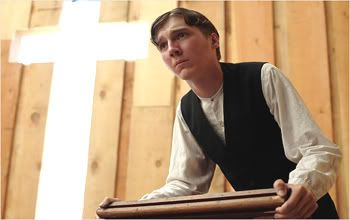
And when their respective egos clash there are fireworks each and every time. What really shows their similarity is the replaying of specific moments, but with the roles reversed – slapping each other, and their forced declarations to God. Both men revelling in their power over the other at the time, relishing seeing their opponent in a weak position.
By tying these characters so closely together it certainly isn't the most pro-religion film you'll ever see. In this story we see no difference between the greedy, competition-driven oilman and the healing preacher spreading the word of God. They are both snake-oil salesman promising a better world for the people they meet; as long as they either allow the oil business into their territory, or accept God into their lives.
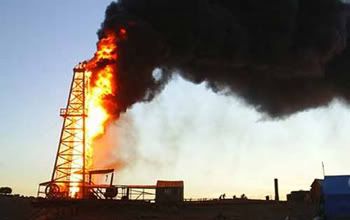
At about the halfway stage the character of Daniel Plainview changes, as does the whole tone and direction of the film. Having appeared to be a fairly normal businessman who just has a drive to succeed up till this point: he then reveals himself to be a horrific, ruthless monster. A man who seems disgusted with anyone he meets; anyone who isn't him. A fact he himself admits. And I personally saw this as the reason for the fracture that occurs in his relationship with H.W. While he does appear to exploit H.W. predominantly as a prop at times to sell his business and himself to people, he did appear to care for him. However I think he saw H.W. as a chance to mould another version of himself, so that there would be at least one more person he could admire and relate to. And I think he wants and indeed needs this, as is showed by his very quick acceptance of his 'brother'. But when his son became deaf not only did he lose his prop but he saw that chance disappear. H.W. was now destined to be just like everybody else.
There are some truly wonderful scenes throughout, whether it be due to the visuals on show or the acting. For me the best and most powerful scene however is the accident and subsequent fire at the derrick. It's an incredible scene both for how it looks and what it tells us about the character of Daniel Plainview. When his son is thrown through the air he is genuinely concerned for H.W.'s wellbeing. He quickly leaves however to return to the scene of the fire. Now at first this can be seen as purely just trying to stop a possible catastrophe, one that could cost the lives of more people. But even after the fire is put out he does not rush back to his son's side as you would expect, he stays to relish in the discovery of the oil and his future wealth, and to bathe in the glory. As the sky turns black with smoke the light that it creates is incredible, creating a truly surreal and unique atmosphere. The eerie orange glow makes it feel like the very fires of hell itself are surrounding Plainview. And perhaps they are, as from here on out Daniel seems to be on a downward spiral.
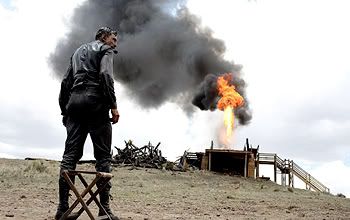
Another of the great successes of the film is how it wonderfully evokes the early 1900s era in which it is set. The sets, scenery and costumes are all magnificent. Even all of the actors look like they just belong in that period. And the in-depth attention to detail given to the workings of the oil drilling just help to fully immerse us in this world that Anderson has created.
I now come to the ending which I am still a little conflicted about. The vocal sparring between Lewis and Dano is absolutely fantastic, one of the best dialogue scenes I've seen in a long time. However it then comes to the incident that ends the movie (won't reveal it here for anyone who hasn't seen it). On the plus side it is extremely memorable and powerful finale, as well as surprising. And it's always nice to be surprised by the ending to a film. On the negative side however I wondered if it just felt a little too cartoonish. I'm unsure if it works tonally with everything that has come before or if I find it a little bit jarring. I've been going back and forth about it for the last few days since seeing the film, and for the moment I think I've come down on the positive side of things..
Conclusion – At the start of this review I mentioned that Anderson appeared to be aspiring to create a masterpiece. So did he succeed? I'm not sure, and I'm certainly not going to state definitively whether he did or not after just one viewing. What I will say is that it's one hell of an effort, and a hell of a good film. One that I would have given the edge to over No Country for Old Men in the Oscar race.
There Will Be Blood (2007)
first viewing
first viewing

Director - Paul Thomas Anderson
Starring - Daniel Day-Lewis/ Paul Dano
"There are times when I look at people and I see nothing worth liking.
I want to earn enough money I can get away from everyone."
I want to earn enough money I can get away from everyone."
You have to admire Paul Thomas Anderson. With There Will Be Blood he didn't just set out to make another film, it appears that he set out to make an epic. His aim was to produce an American masterpiece. Now whether you believe he achieved it or not, I think you at least have to admire the aspirations he had.
Anderson tells the story of Daniel Plainview (Daniel Day-Lewis), a silver prospector who stumbles into the world of oil and becomes determined to conquer that world, and crush all those who dare stand against him. Following a tip he heads out to a small town which hides an ocean of oil beneath it, looking to make his fortune with his son H.W. along for the ride. All is not plain sailing however as he clashes with a young, charismatic preacher (Paul Dano) and has to deal with an accident that leaves his son deaf. An incident that drives a wedge between the two.
Daniel Day Lewis gives a truly great performance as Daniel Plainview. Along with just his general performance he imbues the character with both a great voice and a really distinctive walk. However after all the praise and awards it earned him I was expecting it. So as a result the performance that really grabbed and surprised me was Paul Dano's as the young preacher, Eli Sunday. So much so that I consider it a shame he did not receive more nominations for his work. From the looks of him it might not seem like much of a rivalry can be had against the imposing character that is Daniel Plainview, but his performance makes Eli seem like a worthy adversary and protagonist; someone who is able to get under Plainview's skin. I particularly enjoyed when the character gets in front of his congregation and gets into the full swing of his showman persona, when he starts preaching and healing. It's just a shame for him he isn't around in the age of TV; he's a born televangelist. “Send me your money and you shall be saved!”

And it's just as well that these two central performances are so strong, as there are very few other significant roles to be found. For a film whose running time goes for more than two and a half hours that's quite surprising, and quite an achievement. It may not quite be a strict two-hander but it's not far off.
For long stretches the film can actually be quite quiet and subdued (for example for the first 15 minutes there is hardly a word spoken) but it doesn't matter due to the combination of the beautiful cinematography, stirring score and Lewis' strong, charismatic performance. All of which keeps your attention gripped to the screen.
The film can be seen both as a rather small personal tale, but also as something more epic in scope. While it is a story of greed, religion, family and in many ways how America was built on enterprise and religion it is also the story of two men, both dangerously ambitious. Though they seem set up to be polar opposites they are actually like two peas in a pod. You have the greedy oilman; a cynical capitalist who is driven by pride and a sheer contempt for everyone, leading him down a road of loneliness and misery. And opposing him you have the supposedly righteous man of God: a slick, sanctimonious young man who just loves his own voice, and is willing to denounce his faith in the end for his own financial well-being.

And when their respective egos clash there are fireworks each and every time. What really shows their similarity is the replaying of specific moments, but with the roles reversed – slapping each other, and their forced declarations to God. Both men revelling in their power over the other at the time, relishing seeing their opponent in a weak position.
By tying these characters so closely together it certainly isn't the most pro-religion film you'll ever see. In this story we see no difference between the greedy, competition-driven oilman and the healing preacher spreading the word of God. They are both snake-oil salesman promising a better world for the people they meet; as long as they either allow the oil business into their territory, or accept God into their lives.

At about the halfway stage the character of Daniel Plainview changes, as does the whole tone and direction of the film. Having appeared to be a fairly normal businessman who just has a drive to succeed up till this point: he then reveals himself to be a horrific, ruthless monster. A man who seems disgusted with anyone he meets; anyone who isn't him. A fact he himself admits. And I personally saw this as the reason for the fracture that occurs in his relationship with H.W. While he does appear to exploit H.W. predominantly as a prop at times to sell his business and himself to people, he did appear to care for him. However I think he saw H.W. as a chance to mould another version of himself, so that there would be at least one more person he could admire and relate to. And I think he wants and indeed needs this, as is showed by his very quick acceptance of his 'brother'. But when his son became deaf not only did he lose his prop but he saw that chance disappear. H.W. was now destined to be just like everybody else.
There are some truly wonderful scenes throughout, whether it be due to the visuals on show or the acting. For me the best and most powerful scene however is the accident and subsequent fire at the derrick. It's an incredible scene both for how it looks and what it tells us about the character of Daniel Plainview. When his son is thrown through the air he is genuinely concerned for H.W.'s wellbeing. He quickly leaves however to return to the scene of the fire. Now at first this can be seen as purely just trying to stop a possible catastrophe, one that could cost the lives of more people. But even after the fire is put out he does not rush back to his son's side as you would expect, he stays to relish in the discovery of the oil and his future wealth, and to bathe in the glory. As the sky turns black with smoke the light that it creates is incredible, creating a truly surreal and unique atmosphere. The eerie orange glow makes it feel like the very fires of hell itself are surrounding Plainview. And perhaps they are, as from here on out Daniel seems to be on a downward spiral.

Another of the great successes of the film is how it wonderfully evokes the early 1900s era in which it is set. The sets, scenery and costumes are all magnificent. Even all of the actors look like they just belong in that period. And the in-depth attention to detail given to the workings of the oil drilling just help to fully immerse us in this world that Anderson has created.
I now come to the ending which I am still a little conflicted about. The vocal sparring between Lewis and Dano is absolutely fantastic, one of the best dialogue scenes I've seen in a long time. However it then comes to the incident that ends the movie (won't reveal it here for anyone who hasn't seen it). On the plus side it is extremely memorable and powerful finale, as well as surprising. And it's always nice to be surprised by the ending to a film. On the negative side however I wondered if it just felt a little too cartoonish. I'm unsure if it works tonally with everything that has come before or if I find it a little bit jarring. I've been going back and forth about it for the last few days since seeing the film, and for the moment I think I've come down on the positive side of things..
Conclusion – At the start of this review I mentioned that Anderson appeared to be aspiring to create a masterpiece. So did he succeed? I'm not sure, and I'm certainly not going to state definitively whether he did or not after just one viewing. What I will say is that it's one hell of an effort, and a hell of a good film. One that I would have given the edge to over No Country for Old Men in the Oscar race.
